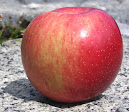Professional league apple bobbing? Fruit Quidditch?
Nope. Biologically, a sport is a spontaneous mutation that produces offspring with abnormal variation from its parents.
Pomologically, there is this added twist. Apples are propagated by grafting, which produces genetically identical trees. An apple sport does not just differ from its two parents, but from itself, or at least its graft antecedent.
Sports may be caused by mutagens, or by cosmic rays or other radiation. At least one breeder tried to create sports by irradiating budwood. (It did not end well.)Most sports entail differences that are not apparent to consumers. These mutations change how the trees bear or when, or how cold-hardy they are or how resistant to disease.
Mutation curated by humans is responsible, over time, for redder apples. Consumers like pretty fruit, and farmers select budwood that will grow the most marketable apples.
This is nothing less than natural selection via agriculture, with human aesthetic preference as the driving force. It's how we got, for instance, Red Delicious from the original Delicious.
Farmers similarly select for hardiness and other beneficial characteristics.
Over time this evolution changes the breed, paradoxically not always for the better, since flavor and texture often suffer.
Very rarely a sport will involve texture or taste and produce, asexually, a new apple variety. Sometimes a sport with only minor differences is marketed as a brand new breed.
Sports can be big business and among popular varieties are legion. Check out the partial list of Delicious sports at Wikipedia.
Probably if you eat any of these varieties today, you are eating a sport, not the original fruit.
If you are a farmer and one of your trees is bearing apples that are uncharacteristically redder or bigger or hardier, you've hit the jackpot. If, that is, it's one of the top industrial apples, such as Fuji or Gala, that are sold year round in supermarkets.
Paradoxically: On the other hand if "all" you've got is a mutation that is sweet and flavorful and new, but not from one of the top ten, you have a much tougher row to hoe to bring it to market.
Sports are supposed to have compound names that incorporate the actual variety name, thus for instance Kiku is really "Fuji Kiku Febrax."
It's not always clear at the market what is a sport and what isn't, sometimes by design. Most of the times I've reviewed sports here have been by accident.

Interesting! Just learned something new. I'm fairly tired of apples of the Fuji, Gala, Red Delicious variety - I'd be excited to eat sports from some of the lesser known apples.
ReplyDelete-Phoebe
Ironically you'd be less likely to encounter sports of lesser-known varieties.
DeleteHeck, it's hard enough to encounter the lesser-know varieties period.
But for the top 10, a slightly redder or hardier variation is a big deal.